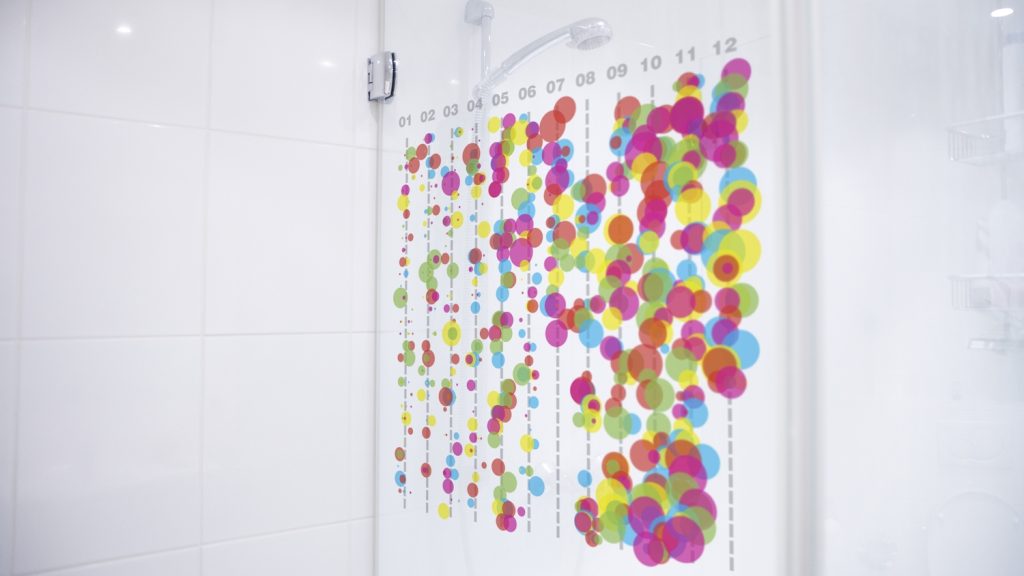Inhaltsverzeichnis:
UX 💚 Earth Day: How can we motivate people to engage in sustainable behaviour?
Today is Earth Day, the perfect day to actively consider how we can design technologies that positively impact our environment and are ecologically sustainable.
Two quick ideas on what sustainable technology should achieve:
- Technologies should remain accessible and usable for older devices and poor internet connections: This avoids electronic waste, promotes accessibility, and supports the Right To Repair initiative.
- We can create technologies that allow users to make environmentally friendly decisions or pursue more sustainable behaviours.
Auf diesen gehen wir kurz näher ein, da sie aus UX Perspektive super interessant ist:
Matthias Laschke’s project “pleasurable troublemakers” (https://www.pleasurabletroublemakers.com/) is a true treasure trove of inspiration and great products dedicated to sustainability. One of our personal favourites is the Shower Calendar Let’s take a closer look at it from a UX perspective: The Shower Calendar aims to help observe and reduce water consumption and contribute to environmental conservation. It is an interactive visualization that uses data from the current water consumption. Dr Laschke’s website explains the exact workings.

The self-determination theory can promote intrinsically motivated behaviour
The Shower Calendar’s design follows a humanistic perspective on motivational psychology, focusing on intrinsically motivated instead of extrinsically motivated behaviour by making the three basic needs developed in the self-determination theory by Deci & Ryan (1987, 2000) experienceable:
- Strengthen perceived self-competence: Feeling competent and successful in pursuing goals (addresses self-efficacy)
- Autonomy experience: Feeling as the cause of one’s actions, being able to determine what one does, and not being externally controlled
- Experience of social inclusion: Feeling connected and belonging to a social group
Experiencing Self-Competence, Autonomy and Social Inclusion
Experiencing self-competence with the Shower Calendar
We experience a strong self-competence through immediate, direct feedback and the resulting sense of self-efficacy (“I can do this”). When taking a long shower and thus consuming too much water, this immediately affects the visualization, providing an opportunity to counteract and change behaviour according to the set goal. One perceives oneself as an active, acting being, which can stimulate the desire to change one’s behaviour. The calendar supports the concept of human beings as proposed by the self-determination theory (Ryan & Deci, 2000), which postulates that people “tend to (psychologically) grow and develop.“
Experiencing Autonomy and Freedom of Choice with the Shower Calendar
The calendar achieves the experience of autonomy and freedom of choice by not directly regulating behaviour – it does not dictate what one should do. Instead, one’s self-initiated action is required. The calendar simply provides insights into behaviour and the opportunity to change. The underlying principle is “you can” instead of “you should”. It gives people the freedom to choose, starting with the decision to press the initial button to start the measurement or to refrain from doing so. According to self-determination theory (Deci & Ryan, 1987), this aspect of freedom of choice can promote intrinsic motivation. Additionally, the calendar does not provide specific instructions for water conservation. It merely provides feedback on our current and past water consumption through ambiguous feedback. Laschke et al. (2011) refer to this as “ambient feedback”, neither paternalistic, judgmental or persistently annoying. The calendar feedback does not make one feel compelled, pressured, or controlled, which is conducive to intrinsically motivated behaviour.
Experiencing Social Inclusion with the Shower Calendar
Social inclusion is made tangible through gamification approaches. For example, the calendar invites users to compete with family members or roommates who also use the calendar. This can turn the calendar into a topic of conversation, for instance, during shared meals (Laschke et al., 2011), which can satisfy the basic need for belonging (Deci & Ryan, 1987). The group can pursue the goal of practising sustainable water management and celebrate collective achievements.
Apart from these three factors, the water consumption visualization does not aestheticize “misbehaviour”. Instead of representing long showers (high consumption) with a less visually appealing or sparser visualization, the circles representing the shower session become smaller with higher consumption. Larger circles portray reduced water consumption and create a colourful and rich pattern, which is the reward for exhibiting “good” behaviour. Undesired behaviour, on the other hand, leads to a barren and less aesthetically pleasing representation.
Evaluation of Usefulness
Two households evaluated a prototype of the calendar. Participants mentioned that the calendar appealed to their ambition to change, leading to personal goal-setting (Laschke et al., 2011). Positive feedback was also received regarding the concept of connection: “[…] Beyond resulting feelings of achievement, competence and control due to the improvement, its ‘social features’ (individualization, persistence) led to communication and competition, and in the case of success, to feelings of popularity and acceptance” (Laschke et al., 2011).
The Important of Making the Abstract Tangible and Experiential
Estimating water consumption is quite strenuous. However, by visualizing daily water usage during showers through immediate feedback on behaviour, the previously abstract concept of water consumption becomes tangible and “graspable” for individuals. It transforms from an abstract concept (difficult consumption estimation) into something “concrete” that individuals can observe and comprehend over time, facilitating internalization and promoting sustainable behaviour.
What other ideas do you have for making technology more sustainable?
Literature
Deci, E. L., & Ryan, R. M. (1987). The support of autonomy and the control of behavior. Journal of Personality and Social Psychology, 53(6), 1024–1037. https://doi.org/10.1037/0022-3514.53.6.1024
Matthias Laschke, Marc Hassenzahl, Sarah Diefenbach, and Marius Tippkämper. 2011. With a little help from a friend: a shower calendar to save water. In CHI ’11 Extended Abstracts on Human Factors in Computing Systems (CHI EA ’11). Association for Computing Machinery, New York, NY, USA, 633–646. DOI: https://doi.org/10.1145/1979742.1979659
Ryan, R. M., & Deci, E. L. (2000). Self-determination theory and the facilitation of intrinsic motivation, social development, and well-being. American Psychologist, 55(1), 68–78. https://doi.org/10.1037/0003-066X.55.1.68
Shower Calendar on the website of Dr. Laschke. http://www.pleasurabletroublemakers.com/shower-calendar (includes demo video of the visualization)
Image credit: Ilustration Event illustrations by Storyset





